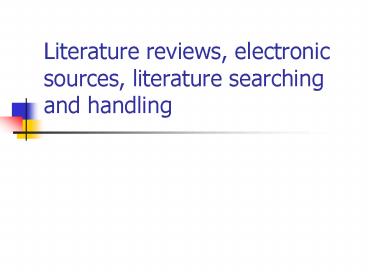Literature reviews, electronic sources, literature searching and handling - PowerPoint PPT Presentation
1 / 20
Title:
Literature reviews, electronic sources, literature searching and handling
Description:
Search for title on OPAC and select Online Journal option. ... of literature searching takes time usually more time than people expect ... – PowerPoint PPT presentation
Number of Views:111
Avg rating:3.0/5.0
Title: Literature reviews, electronic sources, literature searching and handling
1
Literature reviews, electronic sources,
literature searching and handling
2
Session objectives
- The aim of this session is to outline
- The role of the literature review in relation to
a Postgraduate dissertation - The relationship of the literature review to the
evidence base - To demonstrate access to some relevant electronic
information sources - To highlight the transferable principles of
information finding, search strategy formulation
and refinement. - To enable you to be better able to plan, execute
and write-up the literature review element of
your dissertation.
3
Role of the literature review
- The literature review is the means by which we
establish what is already known and recorded
about our chosen research topic.
4
Important Aspects of the literature review
- It is a well-argued and critical evaluation of a
particular issue or problem. Demonstration of
criticality is one aspect of the M level
criteria. - It reveals width and depth in the reading of
relevant and appropriate literature. - It is clearly written and follows the conventions
of bibliographic reporting - It provides the theoretical frameworks which you
will employ in your research
5
Important Aspects of the literature review
- A Literature Review always has a focus on an
issue and the role of the review is to help you
formulate a stance towards that issue. - Do remember that a review of the literature is a
coherent piece of work. In its own way it tells
a story. It should lead the reader through the
analysis and arguments for and against, in a way
which makes sense.
6
Relationship to the research evidence base
- The literature review is part of your evidence
base - It will inform your choice of research approach
so should be initially undertaken early in the
research process - It should continue until the dissertation is
complete, especially in fast moving fields - It sits alongside evidence which you generate via
research methodologies - Your research findings must be matched back to
the theory
7
Information Formats
- Print sources
- Pointing tools Abstracts Indexes
- Electronic sources
- Full text
- e journals
- Access
- Passwords
8
Information Sources
- Encyclopedias
- Dictionaries
- Newspapers (full text)
- Statistics
- Electronic References (LRD web pages)
9
Search strategy
- Define topic identifying key words
- Think of alternative terms you may need to use
- Consider language e.g. American spelling
- Truncation
- Combining terms AND, OR, NOT
10
Accessing Electronic Resources
Electronic Journals
On-line databases
Search for title on OPAC and select Online
Journal option. A password may be required which
can be obtained from your College Librarians.
Access the Athens web page www.athens.ac.uk or
use the Online Databases link from the LRD web
page
Use your Athens user names and password to login
Access the Electronic journals link from the LRD
web pages www.hope.ac.uk/lib/lrd.htm
Select database to use Emerald Computer
Abstracts. Web of Science Expanded Academic Index
Access via Athens, e.g. Swetswise
11
Athens Authentication
- Gateway to electronic resources
- Personalised login
- User Name lhuIDNo
- Password IDNo_lhu
- Where IDNo is the number from your Hope ID card
without the 1 - E.g. 123456-1 would be lhu123456
12
Relevant sources
- We will demonstrate the following
- Computer Abstracts (Emerald)
- Web of Science
- Expanded Academic Index
- Electronic journals
13
Internet
- Vast resource but no review/referee system
- Factors to consider when evaluating internet
sources - The target audience
- Purpose of web page
- Completeness accuracy of links information
14
Internet (2)
- Who is the author/producer are they reliable?
- What authority expertise do they carry?
- Any evidence of bias?
- When was the site produced, is it kept up to
date? - Always keep a hard copy of the page as evidence
of its existence contents
15
Where to start?
- Search engines
- Subject gateways
- Hope LRD web pages
- OPAC
- Subject pages
- Electronic journals
16
Identifying materials relevant for your research
Identify your topic area and key search terms
Identify research and information sources
Formulate search strategy accordingly
Undertake search
Too much retrieval
Insufficient retrieval
Refiine/ Make the search more specific
Refine, i.e. Make the search wider
Search again
Document fully
Sift, sort, and weight
Exclude
Include
17
Following up identified references
Check IOM Library Catalogue
Item present
Item not present
Is item available?
Apply for via the material delivery Service
Check Liverpool Hope Catalogue (OPAC)
No Place reservation
Yes Find material on shelves and loan
18
Time management expectations
- The process of literature searching takes time
usually more time than people expect - When you have identified material it may not be
immediately available - No one information provider can possess
everything that a researcher requires
19
Latest information, expectations and support
- The Hope LRD web pages provide the latest
information on opening times, personnel, services - Material delivery
- Books
- Journal articles/book chapters
- Online Help slots
- Access to other information providers
20
- Any questions?































